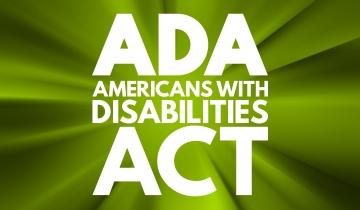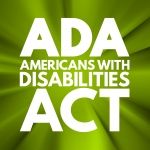This toolkit is designed to help employers comply with Title I of the federal Americans with Disabilities Act of 1990 (ADA), as amended. State and/or local laws may have different, and sometimes stricter, requirements. Employers are advised to research all applicable disability accommodation and anti-discrimination laws to help ensure compliance.
-
Who is protected by the ADA?
Who is protected by the ADA?
The Title I employment provisions of the ADA apply to private businesses that have 15 or more employees, and state and local government employers of any size. This includes full and part-time employees. If you have several sites that are all owned, operated, and managed by your business, then you must count all the employees at these sites. But, if you have different sites that are not owned, operated, or managed by the same business, then you have to count all the employees only if your business is an integrated enterprise. MRA recommends seeking guidance if you are unclear whether your business units must be combined.
The ADA protects a person with a qualifying disability who is qualified for the job. The ADA does not provide a definitive list of disabilities. The ADA has a legal test to decide if a person has an ADA-protected disability.
An individual is considered to have a disability if they have a physical or mental impairment that substantially limits one or more major life activities, have a record of such an impairment, or are regarded as having such an impairment. The ADA also protects a person who has a record of a disability or is regarded as having a disability.
Examples of major life activities are breathing, walking, talking, hearing, seeing, sleeping, caring for oneself, performing manual tasks, and working. In order for an impairment to be serious enough to be an ADA disability, the impairment must substantially limit a major life activity. Major life activities also include major bodily functions.
People who have a known association or relationship with an individual with a disability are also protected from discrimination, but do not qualify for reasonable accommodations solely on the basis on this relationship.
-
What is protected by the ADA?
What is protected by the ADA?
The ADA prohibits discrimination in all employment practices, including:
- Job application procedures, including conducting interviews.
- Hiring, firing, and layoffs.
- Training and recruitment.
- Advancement and tenure reviews.
- Compensation.
- Advertising.
- Work-leave.
- Conditions, benefits, and privileges of employment.
-
What is a reasonable accommodation?
What is a reasonable accommodation?
A reasonable accommodation is any modification or adjustment to a job or the work environment that will enable an applicant or employee with a disability to participate in the application process or to perform essential job functions without creating undue hardship.
-
What is undue hardship?
What is undue hardship?
Undue hardship is an action requiring significant difficulty or expense when considered in light of several factors. These factors include the nature and cost of the accommodation in relation to the size, resources, nature, and structure of the employer's operation. Undue hardship is determined on a case-by-case basis.
- Medical and/or Disability-Related Protections
-
Resources
Resources
MRA Resources:
Policy Development:
Administration:
- Handling an Employee Request for Reasonable Accommodation
- Reasonable Accommodation Employee Request
- Leaves as a Reasonable Accommodation Under the ADA
- Accommodation Medical Inquiry Form
- Accommodation Approval or Denial Notice
- Accommodation Monitoring Form
- Coordination of ADA and FMLA
- Determining Undue Hardship Under the ADA
- What Supervisors Need to Know About Accommodating Disabilities
Additional accommodation resources may be available on our website.
Government Guidance and Resources:
- U.S. Department of Labor (DOL)
- U.S. Equal Employment Opportunity Commission (EEOC)
- Employer Assistance and Resource Network on Disability (EARN)
- Job Accommodation Network (JAN)
State Guidance:
Sources: www.adata.org and those linked.






